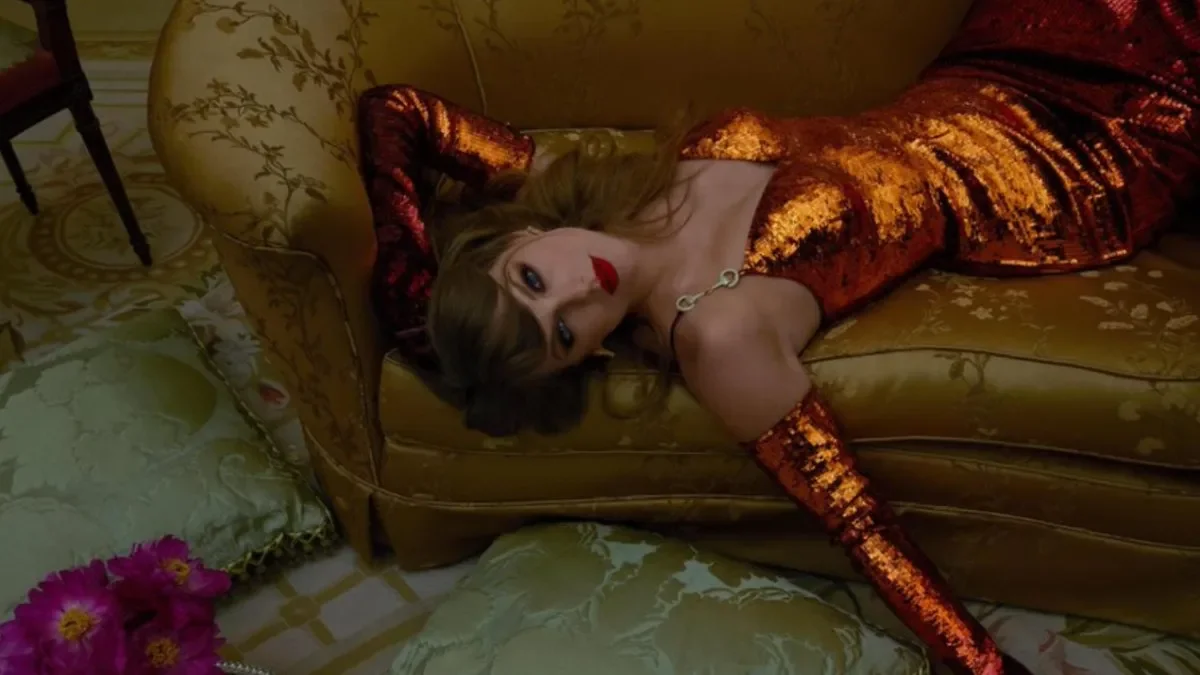Taylor Swift’s “WOOD” Cements Her Status as the Modern Shakespeare
Taylor Swift’s “The Life of a Showgirl” dropped on October 3rd to massive numbers and divisive critiques. Several songs caused quite the stir, but none so pearl-clutching as the reactions to Swift’s thigh-spreading track nine, “Wood.” What is a fun, romping, undoubted ode to her love for fiancé Travis Kelce, and certain, impressive parts of his anatomy, has become, perhaps unsurprisingly, a lightning rod for criticism and pearl-clutching. However, it’s not the underlying misogyny of attacks on a woman daring to talk about her enjoyment and appreciation of sex that I want to tackle (though, I will certainly touch on this unavoidable aspect). It’s another and possibly just as insidious issue that infects the assessment of modern media: the idea that the “greats” of literature were entirely serious, and that fun, silliness, and raunchy references are antithetical to “great” writing.
Look no further than Shakespeare to realize this is entirely untrue. Shakespeare’s constant references to mass-appeal, bawdy humor are an integral part of his style. From the Nurse’s off-color jokes about falling onto one’s back in Romeo & Juliet to the very title of Much Ado About Nothing being modernized best to something like “A Whole Lot About Pussy” (apologies if I’ve shocked you, dear reader, but Shakespeare is undoubtedly proud), this type of writing wasn’t an occasional guest in the greatest English-language writer’s works. It was a hallmark. Shakespeare would not be Shakespeare without these elements, and it’s part of why his work has been so enduring. The plays are downright fun to read. They speak to deep-seated and powerful human emotions, balance tragedy and fate with strong character work and clever wordplay. And they’re funny, too, helping them become massively and unbelievably popular.
I don’t think anyone else in modern history has fit that same description as much as Taylor Swift. Powerful emotionality, themes of fate and tragedy, incredibly intricate and deep character work, and a turn of phrase that brings English Lit majors like me to our knees. But her humor, while always having been present, has never been so knife-sharp, delightful, and apropos for the Modern Bard that she is, than in “Wood.”
Shakespeare would have been delighted at the opening salvo: “Daisy’s bare naked, I was distraught / He loves me not / He loves me not.” The genius of this opener is quintessential to this kind of humor. First, it takes an object that also functions as a woman’s name and sets our expectations that this is going to be a little saucy. Daisy is bare naked, though, also clearly refers to a plucked-clean flower with a woman playing “he loves me, he loves me not” with the petals. This sets up the theme of superstition and unluckiness that is the overt metaphor in the beginning and through most of the song, especially as there is no opportunity for a “He loves me” outcome when both times she repeats the game, she says “He loves me not.” There is no chance for this love. What it also does, though, is give us our very first dick-reference, albeit the sneakiest one of the song. All that’s left in her hand is a stem and a head. No petals or anything else, just something we also use to describe male genitalia.
If you thought that was all from these opening lines, you should reconsider who we are talking about, because Taylor Allison Swift is in no way done. Going all the way back to “Don’t Blame Me” on Reputation, Taylor drops the line “I once was poison ivy but now I’m your daisy.” She’s referencing how her love — at this time with Joe Alwyn — when the rest of the world had turned on her and thought of her as “poison ivy” had made her a sweet little flower that girls use to determine their future with a beau. It’s a charming line that gets turned on it’s head in “Wood.” All the petals have been ripped clean off; he doesn’t love her and she doesn’t love him. But more than that, she’s done with the childish games that led her there. Now, she’s got ahold of something far more adult and yet so much more playful.
This is the ultimate genius of this song. She discards the childish desperation of looking for signs, “bad sign is all good / I ain’t gotta knock on wood” and instead revels in the joys of being in a secure, mature love. Rather than putting weight on what would be considered a childish superstition, like stepping on a crack, she puts her energy toward the fun puns and ribald delights of enjoying a partner who doesn’t make her desperately clamor for hidden meanings of his affection. She has the, um, evidence, of exactly how much he wants her right at her fingertips.
The whole song carries on with penis-puns and dick jokes to make Shakespeare thoroughly proud. The post-chorus in particular really brings things home, with “Forgive me, it sounds cocky / He ah-matized me and opened my eyes / Redwood tree, it ain't hard to see / His love was the key that opened my thighs.” Its clever in the way it revels in the simple wordplay, how it exposes the human need to talk around topics that can make us a bit uncomfortable, and from that, just how many ways we’ve concocted to say “dick” without actually saying it.
And in case it was even slightly unclear that it is Travis Kelce she’s praising, she adds “New Heights (New Heights) of manhood (manhood),” referencing her fiance’s podcast, where she announced this album’s drop. Taylor went from “The Smallest Man Who Ever Lived” on her previous album where she sings the devastating lyric, “didn’t measure up in any measure of a man” to knowing her “hard rock” is on the way.
Moreover, in a victory for the happily petty bitches of the world (including Shakespeare, but that’s a whole other essay), she makes sure to shade all the other men who have come before. Calling her current partner a “Redwood tree” who “opened my thighs” is a clear sign that she is getting something she hasn’t really before: properly pleased in the bedroom. And in an effort to embrace the delighted crassness of this song, as a fuck you to the rampant misogyny on display since she was a literal teenager wherein grown men would indicate that she had been “stretched out” by the “many” partners whom Taylor had previously dated. I remember those comments from actual men in my life to the reporters and the “journalists” of the day. Taylor is making sure they know that if they’re insecure about that, it’s just because their dick is too small to make her happy, anyway.
In anticipation of the aforementioned pearl clutching I am sure is happening with some listeners and readers at this point, Taylor Swift has every right to talk like this. So do I. Just like Shakespeare did, for that matter, because men have been openly speaking like this — and far more explicit — since long before the 1500s, and few if any batted an eye. But a powerful woman in the 21st Century writing a love song to her man’s “magic wand” sends the world into a tailspin.
The efforts to dismiss “Wood” as inappropriate are, ultimately, puritanical nonsense wrapped up in misogyny like an anti-feminist pig-in-a-blanket. But the argument that this song is not clever or worthy of the songwriting talents of Taylor Swift are just entirely missing the point and the clear genius in these lyrics. As Shakespeare proved, just because a title is a genitalia metaphor doesn’t mean it’s not a stroke of genius that should open all of our eyes. And it’s a delightful reminder that both art and sex are allowed to be fun, that maturity is existing in a safe enough space to enjoy all aspects of life, including the ones that are a little silly but also deeply pleasurable. It’s what makes us human, and you’ve got to hand it to the likes of William Shakespeare and Taylor Swift for being able to balance those ideas with such wit and joy.



